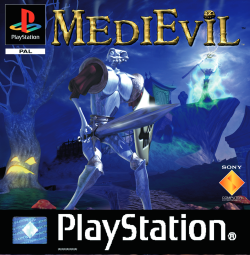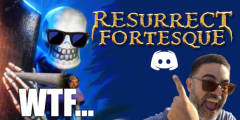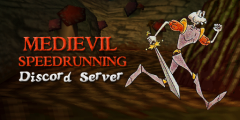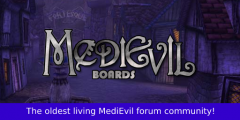MediEvil
|
| MediEvil | ||
|---|---|---|
 PAL region cover art. | ||
| Memory Card icon | ||
| AKA | Dead Man Dan | |
| Tagline(s) | You'll be dying to play! A Gothic Tale Straight from the Grave. | |
| Developer(s) | SCEE Cambridge Studio Implicit Conversions (2024 re-release) | |
| Publishers | Sony Computer Entertainment | |
| Platform(s) | PlayStation, PlayStation Network, Android (Xperia Play) | |
| Release date(s) | October 9, 1998[1]
PlayStation: | |
| Genre(s) | Action-adventure | |
| Ratings | ||
| Mode(s) | Single-player | |
| Serials | SCES-00311 (English)
SCES-01492 (French) | |
| Next game | MediEvil 2 April 21, 2000 | |
MediEvil is an action-adventure hack and slash video game developed by SCEE Cambridge Studio and published by Sony Computer Entertainment. It is the first installment in the PlayStation-exclusive MediEvil series. It follows the journey of Sir Daniel Fortesque, an undead knight undeserving of his reputation as a hero, as he embarks on a quest to redeem himself by defeating the evil sorcerer Zarok. Players need to make their way through the land of Gallowmere, defeating Zarok's minions and solving puzzles along the way.
Development on MediEvil began in 1995 at Millennium Interactive in Great Shelford. Originally targetting Windows 95 and the Sega Saturn for release, Sony's interest in publishing the game led to it becoming a PlayStation exclusive. Over the course of development, the game evolved from a simple Ghosts 'n Goblins-style arcade experience into a Zeldaesque action role-playing game.
MediEvil was released for the original PlayStation (PS1) on October 9, 1998 in Europe, October 21, 1998 in North America, and on June 17, 1999 in Japan. The game received mostly positive praise from critics upon release, but was criticised for its controls and cumbersome camera. Due to its success in Europe, the game was re-released there in late 1999 as a Platinum range title as well as in a bundle with C-12: Final Resistance on May 9, 2003. A sequel, MediEvil 2, was released in 2000 for the PlayStation, and MediEvil: Resurrection, a reimagining, was released in 2005 for the PlayStation Portable (PSP). Finally, a remake of the game for the PlayStation 4 (PS4) was released in 2019.
The game was re-released several times over the years. It was first made available for download on the PlayStation Network (PSN) in 2006. In 2011, the game was re-released for PlayStation® Certified Android devices such as the Xperia Play. In 2024, the game saw a PS4 and PlayStation 5 (PS5) re-release via the PlayStation Plus Premium service.
Gameplay
During the game, players must make their way through various locations, from a graveyard full of zombies, to a flying ghost ship commandeered by an undead pirate crew, to a levitating chessboard in an enchanted forest surrounded by flying demonettes. There are also several collectible items found in the levels which have to be collected in order to make progress. There are several books placed upon lecterns all over areas in the game which may offer advice to Sir Dan, while others contain humorous jokes or the history of the area. Some of them are hidden, but they are mostly found along the path that Sir Dan takes. They can be read if struck with a melee weapon.
Weapons
Dan starts the game with only his detachable arm, which can be used as both a melee and ranged weapon, but is incredibly weak. However, he obtains the small sword and some throwing daggers soon after. The majority of weapons Dan finds are received from the Hall of Heroes by collecting Chalices in each level, and range from swords, axes and hammers to projectile weapons such as crossbows and spears. There are other weapons that Dan finds through the course of the game, such as a club that can be used as a torch, but breaks after too much use; Dragon Armour that lets him breathe fire and makes him impervious to fire attacks; and Chicken Drumsticks that can turn enemies into Roast Chicken for health recovery. Dan is also able to find a variety of shields to protect himself, ranging from copper to gold in strength.
Chalice of Souls
Throughout the levels Sir Dan is presented with an opportunity to collect that particular level's Chalice by filling it up with the souls of his enemies. This mystical item allows him to visit the Hall of Heroes after the conclusion of the level. Dan can only collect the Chalice in each level when he has dispatched enough enough enemies to reach 100%. Chalices are hidden well and are not always at the end of a level, so Dan must sometimes backtrack to find them. In the Hall of Heroes, he can converse with past heroes, "await spiritual guidance" and receive useful items or weapons to help him in his quest. Collecting all the chalices allows the player to see the true ending.
Enemies
There are many adversaries Dan must face on his journey. Sticky-fingered imps, demonic scarecrows, and Zarok's boiler guards are but a few of the ghastly monstrosities that inhabit the land of Gallowmere. Some enemies can only be attacked either at certain times or using specific weapons, such as the scarecrows. Many weapons, such as swords and throwing daggers, can be charged up to produce a more powerful attack to finish enemies off more quickly.
Synopsis
Setting
|
Characters
- Main article: Characters in MediEvil
- Sir Daniel Fortesque - The game's protagonist and playable character. He was King Peregrin's champion when he was alive. He was also one of the first men to die in the battle against Zarok and his Shadow Demons and was proclaimed Hero of Gallowmere by the king so that the people of the land would feel safe. When Zarok returns to raise an army of the dead, he also raises Sir Dan by mistake. Being given a second chance, Dan can finally prove himself a hero that he wasn't in his life by defeating Zarok.
- Zarok the Sorcerer - The game's antagonist. He was King Peregrin's advisor and mage until he began dabbling in Necromancy, which led the King to exile him from the land. Embittered and filled with wrath, he led an army of Shadowy demons into battle against the King. His army was defeated, however, by the King's militia and soon he was proclaimed killed by Sir Dan. In truth, Zarok went into hiding, only to return 100 years later to try and take over the land once again.
- King Peregrin - The past King of Gallowmere. He appointed Sir Dan a knight and banished Zarok from the land. He aids Dan in his quest by telling him how to defeat the Shadow Demons.
- Heroes - Canny Tim, Stanyer Iron Hewer, Bloodmonath Skull Cleaver, Woden the Mighty, Karl Sturnguard, Dirk Steadfast, RavenHooves the Archer, Imanzi Shongama and Megwynne Stormbinder, all aid Dan in his quest by giving him their weapons and other useful items.
Plot
The game starts with a flashback in the 13th century in the fictional Kingdom of Gallowmere. It puts the player in control of Sir Daniel Fortesque: the reanimated skeleton of a deceased champion knight whom history holds in high esteem, due to his supposed heroics in battle against the evil sorcerer Zarok who, in 1286, had raised an army of demons and set out to take over the kingdom. The legend has it that Fortesque lead the King's army into battle against Zarok's demonic hordes and that Sir Daniel himself killed the sorcerer during the battle - despite having been mortally wounded at the outset - cementing his posthumous status as the "Hero of Gallowmere."
This official version of events is later revealed as being vastly exaggerated and that Sir Dan's entire reputation is based on a lie. It turns out that Fortesque was not a hero at all and was in fact the first to die during the Battle of Gallowmere as he was hit in the eye by an arrow while leading the first charge against Zarok's undead armies. Although Sir Dan's troops still managed to go on and win the battle without him, Zarok was able to escape and went into hiding, leading everyone to assume that he was dead. The "fog of war and the shrouds of time" ultimately conspired to portray Fortesque as being the great hero of the battle.
One century later, in 1386, Zarok unexpectedly re-emerges from the shadows, robs the citizens in a nearby village of their souls and awakens his undead army. But the waves of necromantic energy he has unleashed upon the countryside have unwittingly revitalized the skeletal corpse of Sir Fortesque, still missing the eye where he was hit and unable to speak clearly having lost his jawbone. Sir Dan pulls a cobweb out of his eye socket, shakes off the trauma and then grins at the player. Unable to go to the Hall of Heroes in death due to his failures in life, Sir Fortesque sets out from his crypt to exact his revenge upon Zarok and prove himself a true hero now that he has been given a second chance.
After finding a way out of the cemetery, getting through the rest of Gallowmere, making his way to the entrance of Zarok's lair and getting past every other obstacle the lair has, Dan finally makes his way to the lair's arena, where Zarok is waiting. There, Zarok sends out his fleet of skeletal warriors. But before doing this, Dan places one of the chalices he collected onto the white circle in the middle of the arena. This summons the souls belonging to the soldiers who fought in the war a century ago. Seeing that they are all ghosts, their weapons will affect Zarok's warriors, so they charge straight towards them and start fighting while Dan keeps his side alive by zapping them with good lightning (if the player fails to do this, Zarok's side will knock Dan out, resulting in an immediate game over.)
Once Zarok's side loses, Dan's warriors cheer while turning into health vials that Dan collects to get as much energy back as possible (he loses it while using the good lightning on his side). Zarok then summons his champion, Lord Kardok, a skeletal man wielding a mace and riding a skeletal horse. After Dan defeats him, Zarok finally has enough of Dan getting in the way and goes to his lab. There, he tries to turn himself into a monster capable of defeating Dan, while humorously having trouble casting the right spell. Zarok eventually gets it right and then enters the arena revealing himself to be a wingless dragon of some sort. The two fight, with Dan ending up victorious. Zarok then explodes into his normal form, while admitting defeat.
Zarok then gets up and states that if he is to fail, then all shall perish and that Sir Dan is doomed to stay in his lair forever. He then zaps the ceiling with his trident, which makes the roof cave in. While this happens, a big chunk of debris falls on top of Zarok with a humorous squeak. Dan then escapes and makes his way out to the arena entrance while the lair is falling apart. A small flying creature flies towards him, and then the two get blown back by the explosion of a sundial that was next to them. Dan manages to hang onto one of the floating cogs from The Time Device until he gets to a small cave. After brushing the dust off of his amour, Dan runs away from the fire caused by the lair's destruction, but he is unable to outrun it and the explosion sends him off the cliff. As he's falling to his doom, a giant vulture catches him and takes him back to his crypt while the stolen souls return to the people of Gallowmere. The vulture then drops him off at his crypt, which Dan re-enters and returns to his eternal rest.
Endings
The ending is determined by whether or not the player collected all the Chalices of Souls:
- Not all chalices collected: After Dan returns to his eternal rest, the camera will zoom into the eye socket where Dan was not shot till the screen is completely black. The player is awarded a simple "The End" message. Then the credits roll.
- All chalices collected: The same thing happens, only this time Dan ends up going to the Hall of Heroes. When he arrives, the rest of the heroes have come to life (to the point where they're not even statues anymore) and are celebrating. They then notice that Dan has arrived and grown quiet, whispering about his accomplishment. Dan then does a few acrobatics on the table and lands into the central chair, where he catches a cup that he flipped into the air with his foot. One of the heroes fills it up with wine and Dan unsuccessfully drinks it (he is still in his skeletal form, therefore he has no throat). The other heroes then applaud Dan for finally having the courage to defeat Zarok once and for all. The camera then zooms out of the Hall and into the sky, where it shows a constellation of Dan in his heroic stance. "The End" message pops up and the credits roll.
Development
Development of MediEvil started in 1995 at independent developer Millennium Interactive. Chris Sorrell, previously known for the James Pond series, created the original concept for MediEvil and served as the game's creative director. Prior to the development of MediEvil, Sorrell had endured a rather torrid time working on some edutainment products that Millennium Interactive had signed up to create. "Once these products were finally complete, I think management took pity on me and rewarded me with the chance of making my dream game" he recalls. According to Sorrell, the first design proposal for the game described it as a fusion of Capcom's Ghosts 'n Goblins with the art style of Tim Burton – especially the look and feel of The Nightmare Before Christmas, both of which were things that he was a huge fan of back in the mid-'90s. Lead artist and designer Jason Wilson shared his interest in dark, Gothic influenced artwork and they worked together to define the look and feel of the game. Wilson was particularly inspired by German Expressionism from the 1920s and credits films such as Der Golem, The Cabinet of Dr Caligari, Nosferatu, Metropolis and Sunrise as his main sources of inspiration.[20] As development progressed, Wilson pushed the game into more of a Zelda-like direction as opposed to the original arcade-style concept. Sorrell approved of the new direction and said that he would liked to have expanded more on it.
From the outset, Sorrell wanted his game to possess a unique lead character. They worked with a script doctor named Martin Pond when looking for more of a backstory for the lead protagonist, Sir Daniel Fortesque. Pond came up with the idea that Sir Daniel could have been a pompous failure in life whose reincarnation was his one shot at redemption.
In addition to bringing together a brand new team – none of whom had really made a 3D game of this scale before – they were in 'sell' mode almost from day one, with the future of the studio riding on their ability to attract a major publishing deal as quickly as possible. They were initially working on multiple platforms including Windows and Sega Saturn as well as PlayStation before finally having the chance to pitch an early demo to Sony, who were so impressed with their work that they bought the whole studio and became Sony's second United Kingdom development studio. Late in the game's development, Sony requested that MediEvil should support the (then) new PlayStation analogue controller, which Sorrell described as a "particularly fortuitous event" as it allowed them to capture much more fluidity and intuitiveness within the game.
Sorrell said that MediEvil presented a mountain of challenges due to the fact that, like many other developers at the time, they were still very new to 3D gaming. Things like camera and character control presented many interesting new challenges and required the team to try out a number of approaches before settling on solutions that seemed to work. He said that they spent many long nights without sleeping, trying to finish the game. There were also many levels and ideas from the original concept that they were forced to remove because of time and budget constraints. In most cases, the best of what they had already created for those levels ended up being spliced into the levels that they shipped with. There was also intended to be a platform-oriented section of the game where the player would control the worm that lived in Daniel's skull. Concept art and a level ost was created for this section, but it never materialized into the game. Even so, Sorrell said that the game still came very close to the original concept and he was most proud of how the team pulled together to finish the game without compromising on the quirky attention to detail or scope of the game.[21]
Tools
Graphics
- Alias PowerAnimator - Used for creating the FMV models and rendering them on an SGI machine.
- Avid Matador - Used to create textures for the FMV models.
- N-World - A 3D graphics package by Nichimen Graphics used for creating the in-game 3D models.[22][23]
- Photoshop 2 - Used for creating in-game textures.[22]
Other
- Mappy - In-house level mapping tool used to set up enemies, cameras and collisions for the game's levels.[24]
- Psy-Q Software Development Kit
Soundtrack
- Main article: Les musiques de MediEvil
The original soundtrack of the game was made using electronic synthesizers to simulate an entire orchestra and organ. Paul Arnold and Andrew Barnabas composed the tracks. Chris Sorrell, the game's director, asked them to compose a Danny Elfman-style score, similar to those of Beetlejuice, The Nightmare Before Christmas and Batman Returns.[25]
The following tools, CD samples and software were used to create the soundtrack:[26]
- Roland JV1080 synthesizer
- Akai S3200 sampler using Peter Siedlaczek's "Orchestra", "Advanced Orchestra" and "Classical Choir" sample CDs
- Symphonic Adventures CD
- Emagic Logic Audio 3
- Digidesign Protools III PCI
Although there's no official soundtrack release, the 71st issue of the French magazine Joypad featured a CD named "Les musiques de Medievil," which contains ten tracks from the game and is the only "soundtrack" ever released for it.
Tracklist
| # | Track title | Composed by | Length |
|---|---|---|---|
| 1 | "The Awakening" | Andrew Barnabas, Paul Arnold | 2:12 |
| 2 | "Quest for Vengeance" | Andrew Barnabas, Paul Arnold | 2:10 |
| 3 | "Dan's Waltz" | Andrew Barnabas, Paul Arnold | 2:05 |
| 4 | "A difficult path" | Andrew Barnabas, Paul Arnold | 2:08 |
| 5 | "Morten's Dance" | Andrew Barnabas, Paul Arnold | 2:00 |
| 6 | "Enchanted Wood" | Andrew Barnabas, Paul Arnold | 2:09 |
| 7 | "Desecrated Church" | Andrew Barnabas, Paul Arnold | 2:14 |
| 8 | "Journey through the Crystal Caves" | Andrew Barnabas, Paul Arnold | 2:18 |
| 9 | "City in the Clouds" | Andrew Barnabas, Paul Arnold | 2:09 |
| 10 | "Triumph in Death" | Andrew Barnabas, Paul Arnold | 2:42 |
| 11 | "Stuttgart (Exciting)" | Jason Page | 3:20 |
| 12 | "Stuttgart (Panic)" | Jason Page | 3:05 |
| 13 | "Japan" | Jason Page | 3:15 |
| 14 | "USA" | Jason Page | 3:10 |
| 15 | "Alpine" | Jason Page | 3:45 |
| 16 | "Menu" | Jason Page | 1:54 |
Promotion
1996
MediEvil was first unveiled at the Spring European Computer Trade Show (ECTS) in April 1996.[27][28] It was later discussed in issue 35 of the video game magazine Edge where the studio's business development manager, Anil Malhotra, was interviewed about projects in development.[29] The game was slated for release in early 1997.[28][29.1]
1997
The game's next public appearance was at the third Electronic Entertainment Expo (E3) in America in 1997 where the MediEvil Prototype (June '97) was playable.[30][31] This was followed by a marketing push over Summer 1997 where MediEvil was featured in many magazines, including Edge, Joypad, and PlayStation Plus. Finally, the game appeared at the year's ECTS where the MediEvil ECTS Pre-Alpha could be played by attendees. The Sony ECTS 1997 PlayStation Press Pack featuring five discs with press information and promotional materials for Sony's latest titles was also given out to press members. Additionally, a disc known as the Winter Releases '97 demo 01 was distributed at the event as well.[32] This disc featured a rolling demo of MediEvil. A similar demo disc was sent out later in the year to people who registered their PlayStation console.[33]
1998
|
Release
MediEvil was initially released on October 9, 1998 in Europe and October 21, 1998 in North America. The game was dedicated to the memory of Mr. Apple.[34][34.1] It retailed at £39.99 in the UK.[35] The European version of the game is the first known instance of a PlayStation game using LibCrypt protection.[36]
Reception
| Reception | |
|---|---|
| Aggregate scores | |
| Aggregator | Score |
| GameRankings | 80.40%[37] |
| Review scores | |
| Publication | Score |
| Absolute PlayStation | 91%[38] |
| Electronic Gaming Monthly | 7.8/10 |
| Game Revolution | A−[39] |
| GameSpot | 8.2/10[40] |
| IGN | 7.8/10[41] |
| Official PlayStation Magazine (US) | 4/5 |
| PSM | 3/5 |
| PSX Extreme | 6.9/10[42] |
MediEvil received mostly positive reviews, with an 80.40% aggregate rating on Game Rankings.[37] The game received a 7.8/10 from IGN.[41] IGN heralded it as "A fun game and one of PlayStation's classics". GameSpot gave it an 8.2/10, proclaiming that the game is a "welcome surprise".[40] Game Revolution gave the game an A− and stated that "what we have here is one of the cleverest platform games ever made".[39]
According to Jason Wilson, market research for the game in 1998 revealed that the game scored very highly with female gamers, especially in France.[43]
Sales
The game sold over 800K units world-wide by November 1, 1999.[44] The studio was awarded a plaque from Sony for selling 250K copies of the game in the fiscal year ending March 31, 1999. The plaque was auctioned off on eBay in the year 2020.[45]
Accolades
MediEvil was featured within The Guinness Book of Records 1999 due to having the "Most Advanced 3-D Animation."[46][46.1]
Re-releases
Platinum
Due to the game's relative success in Europe, it was re-released as a Platinum range title in late 1999.[4] Inside copies of this version was a poster featuring an insight into MediEvil's sequel, MediEvil 2. This detailed new characters and levels, set in 19th century London.
On the reverse of this image are map instructions for the first four levels of the game. These include details of the locations of vials, Chalices, Life Bottles, Rune Stones, gargoyles, rune hands, copper and silver shields, primary weapons and other secrets which may only be accessible after finding certain items or completing specific tasks.
According to Ukiepedia, the Platinum edition of MediEvil was the 96th best-selling game release of the year 1999 in the UK.[47]
Twin Pack
MediEvil was re-released in a twin pack with Cambridge Studio's final PS1 game C-12: Final Resistance on May 9, 2003.[5]
PlayStation Network
MediEvil was first re-released on the PSN around December 23, 2006 in North America.[6] Initially it could only be played on a PSP, but had to be downloaded using a PlayStation 3 (PS3). The PS3 received firmware update 1.7 on April 19, 2007, which promised to make PS1 games downloaded through the PSN playable on the console. However, the titles themselves were not updated to work on PS3 yet.[48] This update came a few weeks later on May 9, 2007.[49]
MediEvil was set to release on PSN in Europe on June 22, 2007.[50][51] However, this did not happen. The game was eventually released a month later on July 26, 2007.[52] Unfortunately, the game was removed the next day due to "failing at the third level."[53][54] Sony began to issue refunds for the game that August.[55] A fully working version of the game was finally released on September 20, 2007.[7][8] From August 2010 to September 2010, this version was made available for free to European PlayStation Plus subscribers.[56]
The Japanese version of the game was released on the Japanese PSN on November 28, 2007.[9]
Years later, on April 16, 2024, the game saw another PSN re-release made specifically for the PS4 and PS5 consoles. This version was prepared by the company Implicit Conversions, and was enhanced with up-rendering, rewind, quick save, custom video filters and trophy support.[10]
Android
The Android re-release of the game, available exclusively on Xperia Play phones, saw very low sales numbers in its first month, selling between 100 to 500 units in total.[57]
Legacy
|
Credits
| Game Concept/Direction | Chris Sorrell |
|---|---|
| Game Design | Jason Wilson |
| Main Programming | James Busby, Paul Donovan, Chris Sorrell, Matt Johnson, Sam Baker |
| Additional Programming | Derek Pollard, Tim Closs, Dean Ashton |
| Mapping/Development Assistant | Katie Lea |
| Art Design | Jason Wilson |
| Rendered Sequences/Presentation Visuals | Jason Riley |
| Additional Mapping | Lindsay Pollard |
| AV Management | Pete Murphy |
| Original Soundtrack | Andrew Barnabas, Paul Arnold |
| Sound Effects | Paul Arnold |
| Video Post-Production | Tom Oswald |
| Speech Post-Production | Andrew Barnabas |
| Sound Effects/Language Implementation | Gary Richards, William Bell |
| Technologies Management | Mike Ball |
| Technologies Programming | Andrew Ostler, Dean Ashton, Matt Johnson |
| QA Testing Co-ordinator | Sarah-Louise Lloyd |
| QA Testers | Dave Holloway, Alex Sulman, Dan Smith, Stuart Harvey |
| Preliminary Script | Jason Wilson |
| Dialogue Script | Martin Pond |
| Producer | Chris Sorrell |
| Manager (Cambridge Studio) |
Ian Saunter |
| Executive Producer for SCEE | John Roberts |
| Product Manager | Chris Ansell |
| Manual | Written by Jim Sangster
Designed by Steve O'Neill |
| Print Production | Martin Pearce |
| Manual QA Approval | Lee Travers, Stephen Griffiths |
| QA Manager | Tony Bourne |
| Head of the Internal Testing | Steve Archer |
| Testing Co-Ordinator | Jim McCabe |
| Lead Tester | Dave Burke |
| Assistant Lead Tester | Andy Macoy |
| Testers | Ian Cunliffe, Richard Bunn, Anthony Gill, John Cassidy, Dominic Berzins, Ian McEvoy, Phil Bramhill, Dee Norfolk, Lorna Croasdale, Pat Cowan, Carl McKane, Carl Guinney |
| Lead Localisation Tester | Ed Valiente |
| Localisation Testers | Claudia Schuldt, Christa Leonards, Lucie Dupoirieux, Susana Olga Paredes Alcaraz, Ana Maria Juarez-Ordóñez, Andrea Masneri, Miguel Sanchez |
| VOICE ARTISTS | |
| Luis Soto, Paul Darrow, Harry Dickmen, Christopher Kent, Helen Lederer |
Gallery
|
Trivia
- Some promotional posters for the game feature a different cover art design.
- On the game's official US website and on promotional game material, it is said that the game takes place in 847, but this is retconned in the game's sequel, where the year 1386 is revealed to be the true year of the game's events.
- Within the game's memory, the following message can be found: "Buzby sucks eggs, and Eastwood smells!"[58] This refers to James Busby, the game's lead programmer, who left the project about two months prior to its release as a result of creative differences.[59][60]
- The game's logo was made using the Ticonderoga font. The Japanese version of the logo uses a modified iteration of the Harrington font instead.
- The Japanese version of the game contains numerous differences, such as Daniel wearing a helmet.
In other languages
| Language | Name | Meaning |
|---|---|---|
| Arabic | ميد ايفل mid ayfil |
- |
| Chinese (Simplified) | 骷髅战士 Kūlóu zhànshì |
Skeleton Warrior |
| Japanese | メディーバル 甦ったガロメアの勇者 Medībaru yomigaetta garomea no yūsha |
MediEvil: Resurrected Hero of Gallowmere |
| Korean | 메디이블 mediibeul |
- |
See also
 MediEvil fan comic.
MediEvil fan comic. MediEvil fan film.
MediEvil fan film. MediEvil: Hero of Gallowmere mod for The Elder Scrolls V: Skyrim.
MediEvil: Hero of Gallowmere mod for The Elder Scrolls V: Skyrim. MediEvil: Undead Again fan game.
MediEvil: Undead Again fan game.
References
- ↑
 Welcome on MediEvil Official EU Website (archived version).
Welcome on MediEvil Official EU Website (archived version).
- ↑ Challenge the Powers of Darkness in the Gothic World of MediEvil in Business Wire. Published October 21, 1998.
- ↑ Nelson, Randy & Perry, Douglass, MediEvil on IGN. Published October 22, 1998.
- ↑ 4.0 4.1 Official Australian PlayStation Magazine No. 26, page 81. Published by ACP Publishing in September 1999.
- ↑ 5.0 5.1 PSone Twin Pack: C12/Medievil on Amazon.co.uk (archived version). Retrieved May 16, 2023.
- ↑ 6.0 6.1 Doerr, Nick, Even more stuff to download from the PS-Store on Engadget. Published Deccember 23, 2006. Retrieved April 25, 2023.
- ↑ 7.0 7.1 Barker, Anthony, PSN Content 20/09 (US & Europe) on Console Monster. Published September 20, 2007. Retrieved April 27, 2023.
- ↑ 8.0 8.1 PSN STORE UPDATES on Three Speech. Published September 20, 2007. Retrieved April 28, 2023.
- ↑ 9.0 9.1 メディーバル 甦ったガロメアの勇者 on プレイステーション® オフィシャルサイト (archived version). Retrieved April 27, 2023.
- ↑ 10.0 10.1 Michel, Adam, PlayStation Plus Game Catalog for April: Dave the Diver, Tales of Kenzera: Zau, The Crew 2 and more. Published April 10, 2024. Retrieved April 11, 2024.
- ↑ Wong, Raymond, PlayStation Games for Xperia Play Show Up in Android Market on Ubergizmo. Published March 31, 2011.
- ↑ Nelson, Randy, PSOne games begin appearing on Android Market, limited to Xperia Play on Engadget. Published March 31, 2011.
- ↑ MediEvil on Pegi Public Site.
- ↑ MediEvil on نظام ارزیابی و رده بندی سنی بازی های رایانه ای.
- ↑ MediEvil (PS One) on ESRB.org.
- ↑ MediEvil (PS3, PS Vita, PSP) on ESRB.org.
- ↑ Medievil® (메디이블®) on 게임물관리위원회. Published April 27, 2011.
- ↑ MEDIEVIL on Australian Classification Board. Published January 9, 1998.
- ↑ MediEvil on Unterhaltungssoftware Selbstkontrolle. Published August 5, 1998.
- ↑
 Wilson, Jason, Reference and inspiration for the game MediEvil on Facebook. Published November 3, 2014.
Wilson, Jason, Reference and inspiration for the game MediEvil on Facebook. Published November 3, 2014.
- ↑ Dutton, Fred, Behind the Classics: MediEvil on PlayStation.Blog. Published September 7, 2012.
- ↑ 22.0 22.1 jason wilson medievil design history on atomic-city concept art and design of Jason Wilson (archived at Wayback Machine Internet Archive). Retrieved January 4, 2022.
- ↑ "Nichimen Graphics Inc., a company known for helping developers build 3D animation into such games as Super Mario, Final Fantasy VII, and MediEvil, has announced its latest suite of software development tools called Mirai." — Mullen, Micheal, Nichimen Introduces New Animation Tool on Gamespot. Published April 27, 2000. Retrieved January 4, 2022.
- ↑
 Sorcerers - Katie Lea: LEVEL MAPPING on MediEvil Official EU Website (archived version).
Sorcerers - Katie Lea: LEVEL MAPPING on MediEvil Official EU Website (archived version).
- ↑ Ittensohn, Oliver, Interview with composer Paul Arnold on GSoundtracks. Retrieved 18 May, 2012.
- ↑ Medievil 2 case study on Bob and Barn (archived at Wayback Machine Internet Archive).
- ↑ Speciale Ects Spring '96 (ECTS Spring '96 Special) in K, Issue 84, page(s) 48. Published May 1996 by R.C.S. Libri e Grandi Opere S.p.A..
- ↑ 28.0 28.1 Новости с ECTS (News from ECTS) in PRO Игры Magazine, Issue 10, page(s) 23. Published May 1996.
- ↑ An audience with... Millennium in Edge, Issue 35, page(s) 22-26. Published August 1996 by Future Publishing.
- ↑ If the game matches the technical expertise and the imagination and thoroughness of the design, Medievil could be a serious contender early next year. in An audience with... Millennium in Edge, Issue 35, page(s) 22-26. Published August 1996 by Future Publishing.
- ↑ GameFan Presents 1997 E3 in GameFan, Volume 5 Issue 8, page(s) 74-75. Published August 1997 by Metropolis Publications.
- ↑ E3 Preview MediEvil on PSX Nation (archived version). Published June 21, 1997.
- ↑ Goring, Graham, ECTS - Lotta BBW's on uk.games.video.playstation. Published September 8, 1997. Retrieved April 22, 2022.
- ↑ Latah, Is There A Mailing List on uk.games.video.playstation. Published December 1, 1997. Retrieved April 22, 2022.
- ↑
 MediEvil. Developed by SCEE Cambridge Studio. Published by Sony Computer Entertainment on October 9, 1998.
MediEvil. Developed by SCEE Cambridge Studio. Published by Sony Computer Entertainment on October 9, 1998.
- ↑ Credits in
 MediEvil. Developed by SCEE Cambridge Studio. Published by Sony Computer Entertainment on October 9, 1998.
MediEvil. Developed by SCEE Cambridge Studio. Published by Sony Computer Entertainment on October 9, 1998.
- ↑ Credits in
- ↑ "I don't know if everyone is aware of this, but Medievil is out now in the UK - priced £39.99." — MediEvil Out Now - UK !! on uk.games.video.playstation. Published October 8, 1998. Retrieved July 17, 2021.
- ↑ SBI FILES on The PlayStation Datacenter.
- ↑ 37.0 37.1 MediEvil for PlayStation on GameRankings.
- ↑ MEDIEVIL - Review on ABSOLUTE PLAYSTATION (archived version). Published November 1998.
- ↑ 39.0 39.1 MediEvil Review on Game Revolution. Published October 1998.
- ↑ 40.0 40.1 Joe Fielder, MediEvil Review on GameSpot. Published October 23, 1998.
- ↑ 41.0 41.1 Randy Nelson and Douglass Perry, MediEvil on IGN. Published October 22, 1998.
- ↑ Medievil Review on PSX Extreme. Published July 7, 1999.
- ↑
 "During market research for the game in ‘98, MediEvil was found to score very highly with female gamers, especially in France. Women found Sir Dan an appealing character and different to usual macho game characters." — Jason Wilson (@GunnWriter) on X (formerly Twitter) (archived version at Internet Archive Wayback Machine). Published October 9, 2018.
"During market research for the game in ‘98, MediEvil was found to score very highly with female gamers, especially in France. Women found Sir Dan an appealing character and different to usual macho game characters." — Jason Wilson (@GunnWriter) on X (formerly Twitter) (archived version at Internet Archive Wayback Machine). Published October 9, 2018.
- ↑
 Press Release on MediEvil 2 Official Website (archived version).
Press Release on MediEvil 2 Official Website (archived version).
- ↑
 "...Finally we have a 1999 gold plaque the studio received for 250K copies..." — Alex Kanaris-Sotiriou (@Kanaratron) on X (formerly Twitter) (archived version at Internet Archive Wayback Machine). Published November 8, 2020.
"...Finally we have a 1999 gold plaque the studio received for 250K copies..." — Alex Kanaris-Sotiriou (@Kanaratron) on X (formerly Twitter) (archived version at Internet Archive Wayback Machine). Published November 8, 2020.
- ↑ The Guinness Book of Records 1999. Published by Guinness Publishing Ltd. in October 1998.
- ↑ "MediEvil, developed by Sony Computer Entertainment Europe - Cambridge Studios, uses N-World, a modelling and painting package from Nichimen Graphics Inc., which has also been used to produce Super Mario 64 and Final Fantasy VII." — Page 170 of The Guinness Book of Records 1999. Published by Guinness Publishing Ltd. in October 1998.
- ↑ UK Top Selling Games 1999 on Ukiepedia. Retrieved May 16, 2021.
- ↑ "As some PlayStation 3 owners have already discovered, however, the existing PS One software currently available for download doesn't work. Popular speculation as to why this is points to the need to remove the certification key required to play games on Sony's portable platform." — Dunham, Jeremy, PS1 Downloads on PS3 Explained on IGN. Published April 19, 2007. Retrieved December 20, 2024.
- ↑ "Well, it's May and Sony has announced that the PSone format software available from the PlayStation Store will now be operable on both the PS3 and PSP systems. If you've already purchased any titles, you'll be able to re-download them to your PS3 at no additional charge." — Grant, Christopher, PSone titles now working on PlayStation 3 and PSP on Engadget. Published May 3, 2007. Retrieved December 20, 2024.
- ↑ PS STORE RELEASE DATES CONFIRMATION on Three Speech (archived version). Published June 15, 2007. Retrieved April 27, 2023.
- ↑ Yoon, Andrew, Europe finally gets PS1 downloads on Engadget. Published June 15, 2007. Retrieved April 27, 2023.
- ↑ NEW CONTENT AVAILABLE ON THE PSN - THURSDAY 26TH JULY on Three Speech (archived version). Published July 23, 2007. Retrieved April 28, 2023.
- ↑ "After some of you pointed out that MediEvil fails at the 3rd level we have withdrawn the title from the PLAYSTATION®Store for the time being." — Lestrade, MediEvil & Spyro issues on Official PlayStation Community (archived version). Published July 27, 2007. Retrieved April 28, 2023.
- ↑ "Sony has confirmed to Eurogamer that problems with one of the downloadable PSone games released on PlayStation Network last Thursday have led to its withdrawal." — Bramwell, Tom, MediEvil and Spyro PSN bugs on Eurogamer. Published July 30, 2007. Retrieved April 28, 2023.
- ↑ "Sony has said it will refund consumers who bought PSone title Spyro 2: Gateway to Glimmer and now MediEvil from the PlayStation Store." — Bramwell, Tom, Sony refunds borked PSN games on Eurogamer. Published August 10, 2007. Retrieved April 28, 2023.
- ↑ PlayStation Plus Content For August And September on PlayStation.Blog.Europe.
- ↑ Jenkins, David, PSone game sales on Xperia Play below 1,000 downloads on GamesIndustry.biz. Published May 12, 2011.
- ↑
 Hidden Programmer Message on MediEvil Boards. Published January 28, 2012.
Hidden Programmer Message on MediEvil Boards. Published January 28, 2012.
- ↑
 MediEvil developers - Q&A; on MediEvil Boards. Published February 10, 2012.
MediEvil developers - Q&A; on MediEvil Boards. Published February 10, 2012.
- ↑ RETRO Volume 8, page 130. Published in 2015 by Imagine Publishing Ltd.
External links
| ||||||||||||||||||||||||||||||||||||||||||||||||||||||||||||||||||
Gaming Wiki Network
 Discord • X (Twitter) |
The GWN is an affiliation between independently-hosted wikis about video games. | ||
|
We are also affiliated with:
| |||





